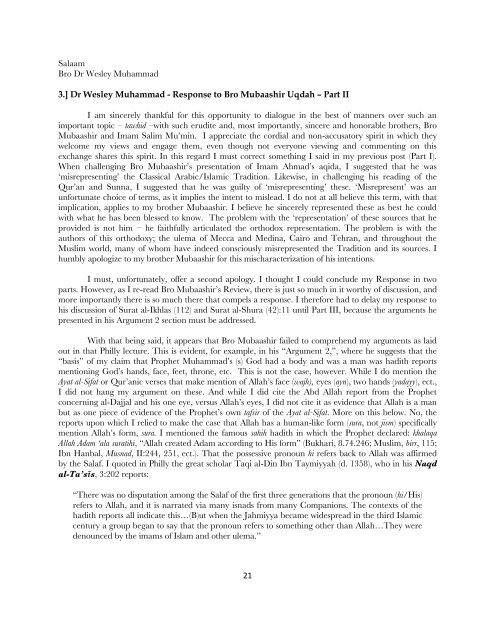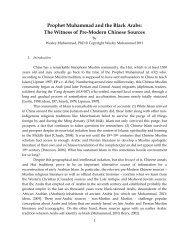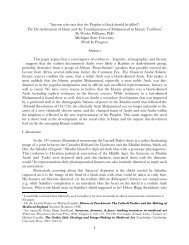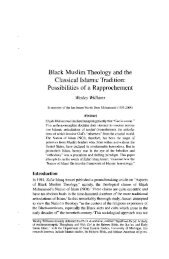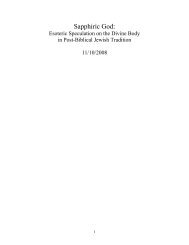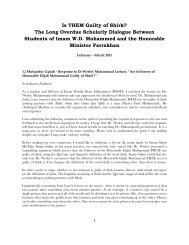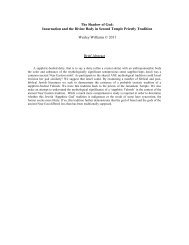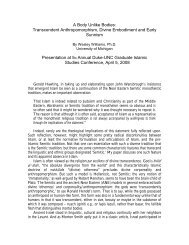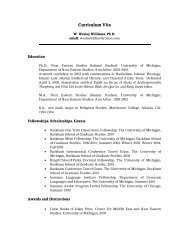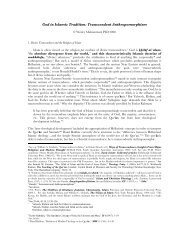Is THEM Guilty of Shirk? - Dr. Wesley Muhammad
Is THEM Guilty of Shirk? - Dr. Wesley Muhammad
Is THEM Guilty of Shirk? - Dr. Wesley Muhammad
You also want an ePaper? Increase the reach of your titles
YUMPU automatically turns print PDFs into web optimized ePapers that Google loves.
Salaam<br />
Bro <strong>Dr</strong> <strong>Wesley</strong> <strong>Muhammad</strong><br />
3.] <strong>Dr</strong> <strong>Wesley</strong> <strong>Muhammad</strong> - Response to Bro Mubaashir Uqdah – Part II<br />
I am sincerely thankful for this opportunity to dialogue in the best <strong>of</strong> manners over such an<br />
important topic – tawhid –with such erudite and, most importantly, sincere and honorable brothers, Bro<br />
Mubaashir and Imam Salim Mu‘min. I appreciate the cordial and non-accusatory spirit in which they<br />
welcome my views and engage them, even though not everyone viewing and commenting on this<br />
exchange shares this spirit. In this regard I must correct something I said in my previous post (Part I).<br />
When challenging Bro Mubaashir‘s presentation <strong>of</strong> Imam Ahmad‘s aqida, I suggested that he was<br />
‗misrepresenting‘ the Classical Arabic/<strong>Is</strong>lamic Tradition. Likewise, in challenging his reading <strong>of</strong> the<br />
Qur‘an and Sunna, I suggested that he was guilty <strong>of</strong> ‗misrepresenting‘ these. ‗Misrepresent‘ was an<br />
unfortunate choice <strong>of</strong> terms, as it implies the intent to mislead. I do not at all believe this term, with that<br />
implication, applies to my brother Mubaashir. I believe he sincerely represented these as best he could<br />
with what he has been blessed to know. The problem with the ‗representation‘ <strong>of</strong> these sources that he<br />
provided is not him – he faithfully articulated the orthodox representation. The problem is with the<br />
authors <strong>of</strong> this orthodoxy; the ulema <strong>of</strong> Mecca and Medina, Cairo and Tehran, and throughout the<br />
Muslim world, many <strong>of</strong> whom have indeed consciously misrepresented the Tradition and its sources. I<br />
humbly apologize to my brother Mubaashir for this mischaracterization <strong>of</strong> his intentions.<br />
I must, unfortunately, <strong>of</strong>fer a second apology. I thought I could conclude my Response in two<br />
parts. However, as I re-read Bro Mubaashir‘s Review, there is just so much in it worthy <strong>of</strong> discussion, and<br />
more importantly there is so much there that compels a response. I therefore had to delay my response to<br />
his discussion <strong>of</strong> Surat al-Ikhlas (112) and Surat al-Shura (42):11 until Part III, because the arguments he<br />
presented in his Argument 2 section must be addressed.<br />
With that being said, it appears that Bro Mubaashir failed to comprehend my arguments as laid<br />
out in that Philly lecture. This is evident, for example, in his ―Argument 2,‖, where he suggests that the<br />
―basis‖ <strong>of</strong> my claim that Prophet <strong>Muhammad</strong>‘s (s) God had a body and was a man was hadith reports<br />
mentioning God‘s hands, face, feet, throne, etc. This is not the case, however. While I do mention the<br />
Ayat al-Sifat or Qur‘anic verses that make mention <strong>of</strong> Allah‘s face (wajh), eyes (ayn), two hands (yadayy), ect.,<br />
I did not hang my argument on these. And while I did cite the Abd Allah report from the Prophet<br />
concerning al-Dajjal and his one eye, versus Allah‘s eyes, I did not cite it as evidence that Allah is a man<br />
but as one piece <strong>of</strong> evidence <strong>of</strong> the Prophet‘s own tafsir <strong>of</strong> the Ayat al-Sifat. More on this below. No, the<br />
reports upon which I relied to make the case that Allah has a human-like form (sura, not jism) specifically<br />
mention Allah‘s form, sura. I mentioned the famous sahih hadith in which the Prophet declared: khalaqa<br />
Allah Adam „ala suratihi, ―Allah created Adam according to His form‖ (Bukhari, 8.74.246; Muslim, birr, 115;<br />
Ibn Hanbal, Musnad, II:244, 251, ect.). That the possessive pronoun hi refers back to Allah was affirmed<br />
by the Salaf. I quoted in Philly the great scholar Taqi al-Din Ibn Taymiyyah (d. 1358), who in his Naqd<br />
al-Ta’sīs, 3:202 reports:<br />
―There was no disputation among the Salaf <strong>of</strong> the first three generations that the pronoun (hi/His)<br />
refers to Allah, and it is narrated via many isnads from many Companions. The contexts <strong>of</strong> the<br />
hadith reports all indicate this…(B)ut when the Jahmiyya became widespread in the third <strong>Is</strong>lamic<br />
century a group began to say that the pronoun refers to something other than Allah…They were<br />
denounced by the imams <strong>of</strong> <strong>Is</strong>lam and other ulema.‖<br />
21


